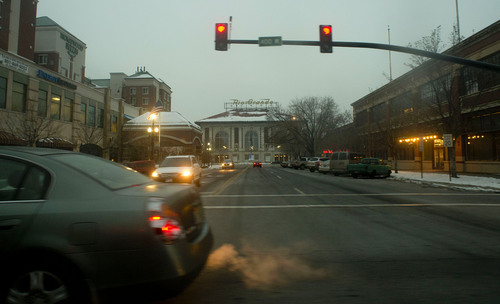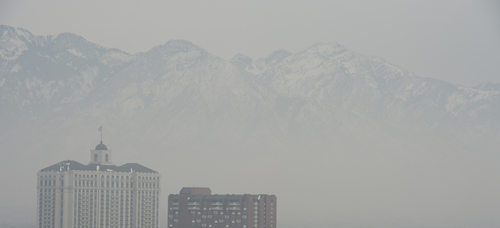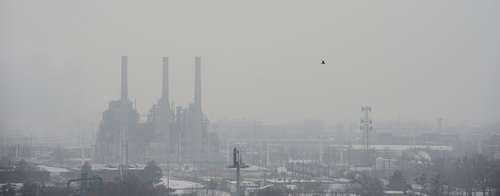This is an archived article that was published on sltrib.com in 2013, and information in the article may be outdated. It is provided only for personal research purposes and may not be reprinted.
Utahns may disagree about the severity of the Wasatch Front's air pollution, but most believe it is getting worse and nearly all are willing to play a part in fixing it, according to survey results released Thursday.
Most respondents said they are interested in carpooling, taking public transit and lowering thermostats, especially if financial incentives were offered, as ways to reduce the amount of particulate pollution choking the skies during winter inversions.
"I'm not surprised that Utahns tend to recognize their personal responsibility and are willing to do something," said Robert Grow, president of Envision Utah, which commissioned the survey.
The nonprofit hired the polling firm Heart + Mind Strategies to determine not just how Utahns feel about dirty air, but also why they feel that way.
The purpose is to help craft a public outreach campaign this winter to inform residents what they can do to reduce particulate emission, which undermines health, particularly in young children and the elderly.
Heart + Mind solicited 500 Utahns to participate in an online survey over several days in early September. They were selected to achieve a representative sample of Wasatch Front communities. On average, it took 23 minutes for respondents to complete the questionnaire.
The latest findings back recent survey results by the Utah Foundation, which found air quality tops voters' list of priority issues. The new survey found scenic beauty and outdoor recreation are the two strongest factors supporting Utah's quality of life. Air quality had the most negative influence.
Advocates hope this mounting interest in air quality spurs people to make changes that help everyone breathe easier.
"By taking steps to reduce your personal contribution to air pollution in the days preceding anticipated poor air quality, you are not only taking action when it counts the most but also taking that important first step to building lifelong habits that will help insure our air stays clean well into the future," said a statement from pediatrician Michelle Hofmann, a board member for Breathe Utah and UCAIR, both nonprofits involved in air quality.
Air quality's profile as a political issue is reaching new peaks, even as 20 years of monitoring data show Wasatch Front particulate pollution has declined. Still, 78 percent of the Heart + Mind respondents said air quality has worsened over the past two decades.
Grow attributed this belief to the lowering of the federal threshold for fine particulate to 35.5 micrograms per cubic meter of air. Utah's urban valley bowls often breach this standard in the winter, as was the case much of this past week before Thursday's snowstorm cleared out the gunk.
"I don't think people are exposed to the data often," Grow said. "They are reacting to the changing health standard. Even if air quality is better, we have to do better. They don't want that to become an excuse."
Respondents tend to underestimate vehicles' contribution to the problem, but they did view reducing vehicle emissions as the most effective strategy for solving it.
Expanding public transportation topped the list of measures seen as promising, along with improving the energy efficiencies of homes and buying new low-emission vehicles.
Conservative respondents were more likely to view air pollution as a problem that lasts only a few weeks in summer and winter. Moderates and liberals were more likely to see it as a year-round threat.
But Grow wasn't reading too much into that finding.
"This isn't a Democratic and Republican issue. This is about our children and the place we live and the air we breathe," Grow said. "I don't think people's political backgrounds matter that much. We are seeing a strong coming together in Utah. That's where civic will comes from."







